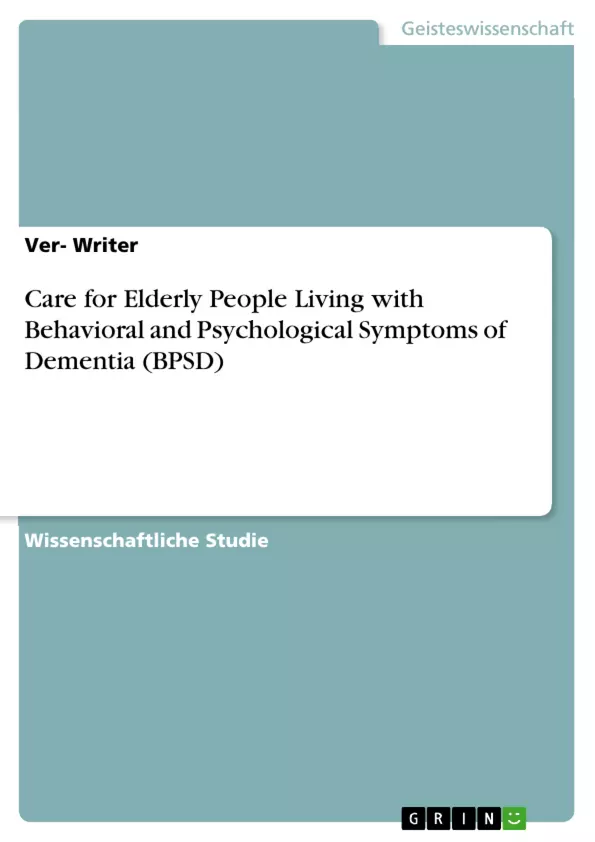This paper is a wide explanation of services rendered by the caregivers on the well fare of elderly individuals with dementia by systematically reviewing the existing care givers in Australia.
Good care should be offered to the aging population especially people living with Behavioral Psychological Symptoms dementia (BPSD). For people with dementia, doctors may not be able to identify and treat the symptoms effectively. Behavioral and Psychological symptoms of dementia (BPSD) are extremely a disaster and prevalent in care.
In contrary to the inadequate efficiency of medical healings, training care people should not only understand but also they should manage these symptoms for the importance of quality and safety of life of aging people living with symptoms of dementia in the world. Notably, caregivers to people living with dementia play a big role in assessment and identification of ailment. In recent years, there are high deficiencies in this area of study.
Frequently asked questions
What are Behavioral and Psychological Symptoms of Dementia (BPSD)?
Behavioral and Psychological Symptoms of Dementia (BPSD) are a range of disturbances in thinking, mood, or behavior that can occur in people with dementia. These symptoms can be very challenging for both the person with dementia and their caregivers.
How do existing services support older people living with BPSD?
Good care should be offered to the aging population, especially those living with Behavioral Psychological Symptoms dementia (BPSD). Doctors may not always be able to effectively identify and treat these symptoms. Caregivers play a critical role in assessment and identification of ailments. This document provides a wide explanation of services rendered by caregivers, focusing on the practices of Wintringham and HammondCare in Australia.
What is Wintringham?
Wintringham is an independent, non-profit organization founded in 1989 in Australia. It focuses on providing services to aging people living with dementia, particularly elderly homeless individuals. In 2011, the United Nations awarded Wintringham a certificate of Habitat Scroll of Honor.
What services does Wintringham provide?
Wintringham provides care for aging people who are homeless and disowned by the aged care sector. They focus on social justice, ensuring elderly people have decent housing and human rights, and are not discriminated against based on ethnicity, age, skin color, or financial worth.
What is HammondCare?
HammondCare is a Christian charity founded in the 1930s in Australia. It specializes in dementia care, rehabilitation, palliative care, and elderly people's mental health services. They aim to support financially unstable elderly persons in need.
What techniques can improve care given to elderly people living with BPSD?
The document outlines various techniques to improve care for elderly people with BPSD, including individualized, person-centered care practices, staff training to identify and treat underlying factors, and a versatile, oriented approach to care. These include addressing the individual's personal preferences, routines, lifetime occupations, recent losses, likes/dislikes, and things that help to distract, engage, or calm the person.
What role does medication play in the care of elderly people with BPSD?
The document emphasizes the importance of minimizing the use of antipsychotic, antianxiety, and hypnotic drugs. Medication should be used at the minimal possible dose for the shortest duration necessary to maintain the person's highest level of psychosocial and psychological well-being. Interdisciplinary communication is critical.
What are the recommended dining programs for elderly people with BPSD?
The document suggests providing three different dining programs to cater to different stages of dementia: Super Clubs (early stage), Main Dining Room (independent individuals with minimal assistance), Better Club (middle stage, directing and assisting memory loss patients), and Star Club (late stage, feeding assistance provided).
- Quote paper
- Ver- Writer (Author), 2016, Care for Elderly People Living with Behavioral and Psychological Symptoms of Dementia (BPSD), Munich, GRIN Verlag, https://www.grin.com/document/375983



